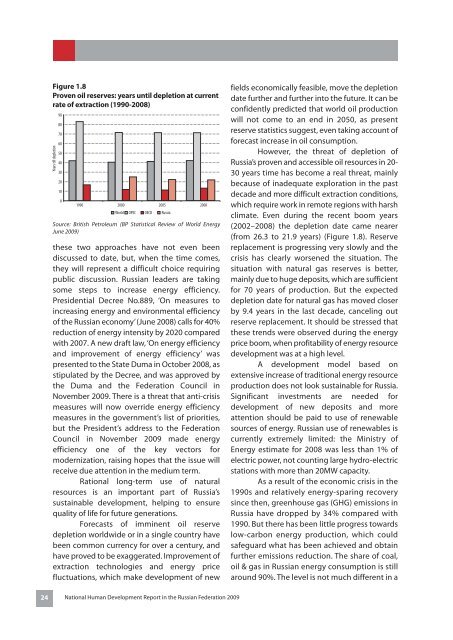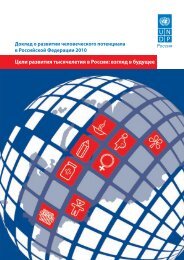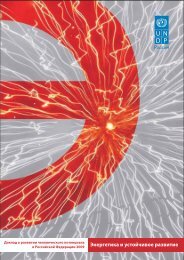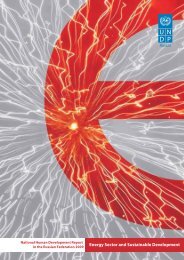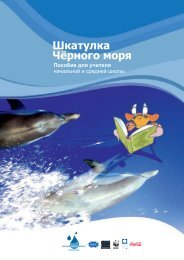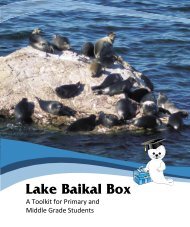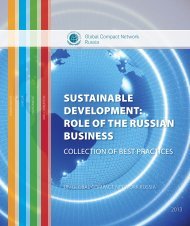Report - UNDP Russia
Report - UNDP Russia
Report - UNDP Russia
You also want an ePaper? Increase the reach of your titles
YUMPU automatically turns print PDFs into web optimized ePapers that Google loves.
Figure 1.8Proven oil reserves: years until depletion at currentrate of extraction (1990-2008)Years till depletion90807060504030201001990 2000 2005 2008World OPEC OECD <strong>Russia</strong>Source: British Petroleum (BP Statistical Review of World EnergyJune 2009)these two approaches have not even beendiscussed to date, but, when the time comes,they will represent a difficult choice requiringpublic discussion. <strong>Russia</strong>n leaders are takingsome steps to increase energy efficiency.Presidential Decree No.889, ‘On measures toincreasing energy and environmental efficiencyof the <strong>Russia</strong>n economy’ (June 2008) calls for 40%reduction of energy intensity by 2020 comparedwith 2007. A new draft law, ‘On energy efficiencyand improvement of energy efficiency’ waspresented to the State Duma in October 2008, asstipulated by the Decree, and was approved bythe Duma and the Federation Council inNovember 2009. There is a threat that anti-crisismeasures will now override energy efficiencymeasures in the government’s list of priorities,but the President’s address to the FederationCouncil in November 2009 made energyefficiency one of the key vectors formodernization, raising hopes that the issue willreceive due attention in the medium term.Rational long-term use of naturalresources is an important part of <strong>Russia</strong>’ssustainable development, helping to ensurequality of life for future generations.Forecasts of imminent oil reservedepletion worldwide or in a single country havebeen common currency for over a century, andhave proved to be exaggerated. Improvement ofextraction technologies and energy pricefluctuations, which make development of newfields economically feasible, move the depletiondate further and further into the future. It can beconfidently predicted that world oil productionwill not come to an end in 2050, as presentreserve statistics suggest, even taking account offorecast increase in oil consumption.However, the threat of depletion of<strong>Russia</strong>’s proven and accessible oil resources in 20-30 years time has become a real threat, mainlybecause of inadequate exploration in the pastdecade and more difficult extraction conditions,which require work in remote regions with harshclimate. Even during the recent boom years(2002–2008) the depletion date came nearer(from 26.3 to 21.9 years) (Figure 1.8). Reservereplacement is progressing very slowly and thecrisis has clearly worsened the situation. Thesituation with natural gas reserves is better,mainly due to huge deposits, which are sufficientfor 70 years of production. But the expecteddepletion date for natural gas has moved closerby 9.4 years in the last decade, canceling outreserve replacement. It should be stressed thatthese trends were observed during the energyprice boom, when profitability of energy resourcedevelopment was at a high level.A development model based onextensive increase of traditional energy resourceproduction does not look sustainable for <strong>Russia</strong>.Significant investments are needed fordevelopment of new deposits and moreattention should be paid to use of renewablesources of energy. <strong>Russia</strong>n use of renewables iscurrently extremely limited: the Ministry ofEnergy estimate for 2008 was less than 1% ofelectric power, not counting large hydro-electricstations with more than 20MW capacity.As a result of the economic crisis in the1990s and relatively energy-sparing recoverysince then, greenhouse gas (GHG) emissions in<strong>Russia</strong> have dropped by 34% compared with1990. But there has been little progress towardslow-carbon energy production, which couldsafeguard what has been achieved and obtainfurther emissions reduction. The share of coal,oil & gas in <strong>Russia</strong>n energy consumption is stillaround 90%. The level is not much different in a24 National Human Development <strong>Report</strong> in the <strong>Russia</strong>n Federation 2009


